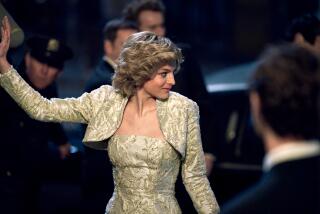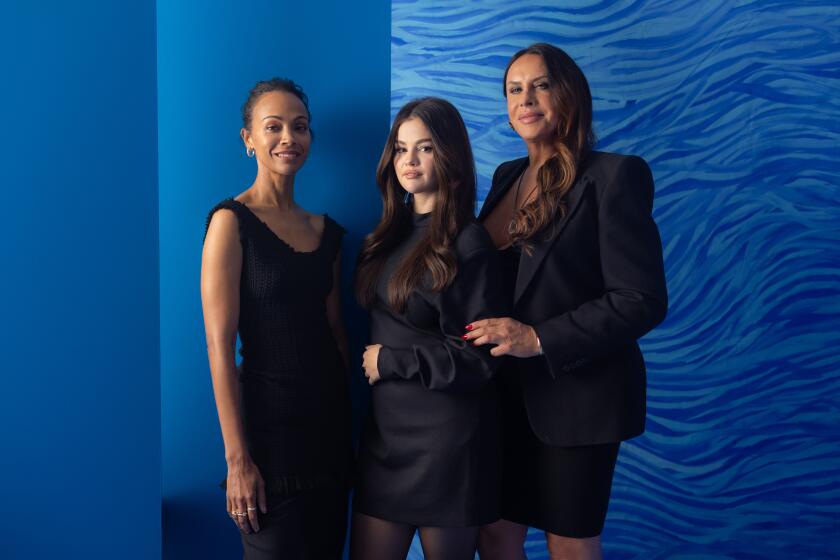Review: The stirring ‘Wonder Woman’ comes to the rescue of the DC Comics universe

Justin Chang reviews ‘Wonder Woman’, directed by Patty Jenkins, starring Gal Gadot, Chris Pine, Robin Wright, Danny Huston, David Thewlis, Connie Nielsen, Elena Anaya, Lucy Davis, and Ewen Bremner. Video by Jason H. Neubert.
Early on in “Wonder Woman,” the unexpectedly thrilling new movie in the typically non-thrilling DC Extended Universe, the Amazonian princess Diana (Gal Gadot) makes the mistake of lowering her guard mid-training, which allows her mentor, Antiope (Robin Wright), to go in for the kill. “You expect a battle to be fair!” Antiope scolds her, in between thrusts and parries. “A battle will never be fair!”
There’s more than one way to read that line, and a few others in Allan Heinberg’s screenplay. You don’t have to be an entertainment-industry analyst or a scholar of the male gaze to grasp that the history of the movies is also a history of deeply entrenched sexism, and that the battle has never been a fair one for any woman longing to make her mark on either side of the camera.

Watch the trailer for “Wonder Woman.”
Certainly this sad state of affairs goes some way toward explaining why Wonder Woman has captivated generations since her first 1940s comic-book appearance. She staked her claim on the TV landscape when Lynda Carter played her in the mid-’70s, but until now, she has never had a Hollywood feature to call her own. Nor was there any guarantee that, granted the opportunity, anyone would succeed in doing her, well, justice.
The dispiritingly crass sensibility of what we are expected to call the DC Extended Universe has done little to challenge that suspicion. Considering the recent epic muddle of “Batman v Superman: Dawn of Justice” (in which Gadot’s Wonder Woman showed up unannounced to complicate an already overblown climax) and the wretched miscalculation of “Suicide Squad,” there was every reason to fear that this legendary heroine’s long-overdue close-up would be, at best, another disappointment.
What a delight to be proven wrong. “Wonder Woman” emerges as not only the strongest movie in the present DC cycle, but also the first one that feels like an enveloping, honest-to-God entertainment rather than a raging cinematic migraine.
With forthright emotion, spirited humor, a surprisingly purposeful sense of spectacle but a sincere commitment to their protagonist’s humanitarian ideals, director Patty Jenkins and her collaborators have taken the well-worn superhero origin story and invested it with a rich, sometimes revelatory depth of feeling. This Wonder Woman doesn’t just save the world; if the gods are willing, she may yet save a billion-dollar movie franchise.
As the first woman to direct a superhero epic for a major studio, Jenkins is no doubt as familiar with the tough realities of the industry as she is with the high-stakes urgency of this project — her first feature, incidentally, since her Oscar-winning 2003 debut, “Monster.” Yet until the big-bang finish, you rarely sense her straining for effect. One of the most disarming things about “Wonder Woman” is the deceptively casual attitude it displays toward the radicalism of its undertaking.
Equally inspired by the women’s suffrage movement, the pacifist movement and the pin-up movement, Wonder Woman herself has always been a welter of contradictions — sculpted from clay and filled with the breath of Zeus, perhaps, but no less profoundly shaped by market imperatives and feminist influences. (Those contradictions are as thorny as ever, if a recent, abortive effort to brand her as a United Nations Honorary Ambassador for the Empowerment of Women and Girls is any indication.)
When she first emerged from the pen of the comic-book artist and psychologist William Moulton Marston in 1941, Wonder Woman was, naturally, fighting against the backdrop of World War II. Heinberg has shrewdly repositioned her on the front lines of the previous global conflict, when the weapons were simpler and the lines between good and evil not quite so cleanly demarcated.
In the film, our introduction to Diana seems to take place in an ancient, mythological realm far beyond the reach of early 20th century militarism. That would be Themyscira, the lush island home of the fierce female fighters known as the Amazons, who were raised up by Zeus eons ago to defeat his evil son Ares, the god of war. Having done so, the Amazons now spend their days enjoying paradise, speaking bizarrely accented English, training for battle and remaining ever watchful for Ares’ return.
Played as a young girl by actresses Lilly Aspell and Emily Carey (in a chapter that the film somehow avoids titling “Waiting for Gadot”) the beautiful Diana is especially eager to study the art of combat. Under the secret tutelage of her aunt Antiope, away from the disapproving eyes of her mother, Queen Hippolyta (Connie Nielsen), Diana grows up to become the most gifted warrior among the Amazons. There’s no altering her destiny once she rescues a downed pilot (Chris Pine) from the sea (shades of “The Little Mermaid”) and lifts the gauzy magic veil that isolates Themyscira from the war-torn outside world circa 1918.
After a deadly skirmish between the Amazons’ blades and arrows and the Germans’ guns, Diana realizes that humanity needs her help. She joins forces with the pilot, Steve Trevor, who is working as a spy for British intelligence. Bidding her people a solemn farewell, she nobly sets out to end the global cataclysm that, for her, is a clear sign of Ares’ resurgence.
And so begins a journey to the Western Front by way of London, which the movie plays for some gentle fish-out-of-water comedy as Steve and his secretary, Etta (a sharp Lucy Davis), try to teach her how to behave in rigid British society. Naturally Diana, who can speak nearly every language in the world but has never before known the pleasures of cute babies and ice cream, seizes every opportunity to do the wrong thing — and each time, weirdly and instinctively, it turns out to be the right thing.
There’s a tricky balance of humor and exposition at work here, as Diana must play the role of the unworldly naif, highly educated on the one hand yet heavily reliant on Steve’s guidance on the other. And if the specific limits of Diana’s knowledge don’t always make sense — would someone who claims to have extensively read Clio, the Greek muse of history and epic poetry, really be so ignorant of the human capacity for good and evil? — her innocence ultimately feels like a tonic, a bracing relief from the brooding psychological torment that has come to pass for character depth in the male-dominated superhero universe.
In any event, one’s reservations, whatever they may be, all but melt away in the fire of Gadot’s warm, impassioned heroics. Righteous, single-minded and unafraid to tell off the highest members of British government when they demonstrate more political calculation than valor, Diana has a demigod’s certainty and a total immunity to embarrassment.
Put more bluntly, she totally kicks ass — and that’s before she strides into the trenches wielding a sword, a shield, two bullet-deflecting arm bracelets and the golden Lasso of Truth (imagine a cowgirl with a polygraph and you’re halfway there). The battle sequence that follows brings new meaning to the term “no man’s land” and has the power to fill even the most jaded moviegoer with primal stirrings of fear, pride and emotion.
What she is up against, in the end, seems par for the course: a fiendish plot hatched by a megalomaniacal German general (Danny Huston) and his sadistic chemist (Elena Anaya), who goes by the nom de guerre of Doctor Poison. To end the war to end all wars, Diana and Steve will rely on a diverse band of brothers including a Moroccan polyglot (Saïd Taghmaoui), a Scottish sniper (Ewen Bremner) and a Native American black marketeer (Eugene Brave Rock), all under the oversight of a knowing British superior (a commanding David Thewlis).
The usual complications ensue: sharp twists, big explosions, fateful acts of courage and sacrifice. But the real pleasure, and novelty, of “Wonder Woman” is in the delicacy with which Jenkins teases out the love story at the movie’s core, allowing Diana her agency as a sexual being while unabashedly treating Pine, in one scene, as an “above-average” slab of PG-13 beefcake. It’s in the way the director holds off the inevitable CGI firestorm for as long as possible, trusting that wit, beauty and narrative cohesion are by far the most special effects in a filmmaker’s toolkit.
Most of all, it’s in the deceptive ease with which Jenkins lulls you into two curious but strangely non-conflicting sensations. Namely, that you’ve seen this movie many times before, and also that you’ve never seen anything quite like it.
------------
‘Wonder Woman’
Rating: PG-13, for sequences of violence and action, and some suggestive content
Running time: 2 hours, 21 minutes
Playing: In general release
See the most-read stories in Entertainment this hour »
Movie Trailers
ALSO:
Lebanon officially bans ‘Wonder Woman’ from theaters
The world needs Wonder Woman. Director Patty Jenkins explains why
‘Game of Thrones’ has become an unlikely tale of female empowerment
More to Read
Only good movies
Get the Indie Focus newsletter, Mark Olsen's weekly guide to the world of cinema.
You may occasionally receive promotional content from the Los Angeles Times.











